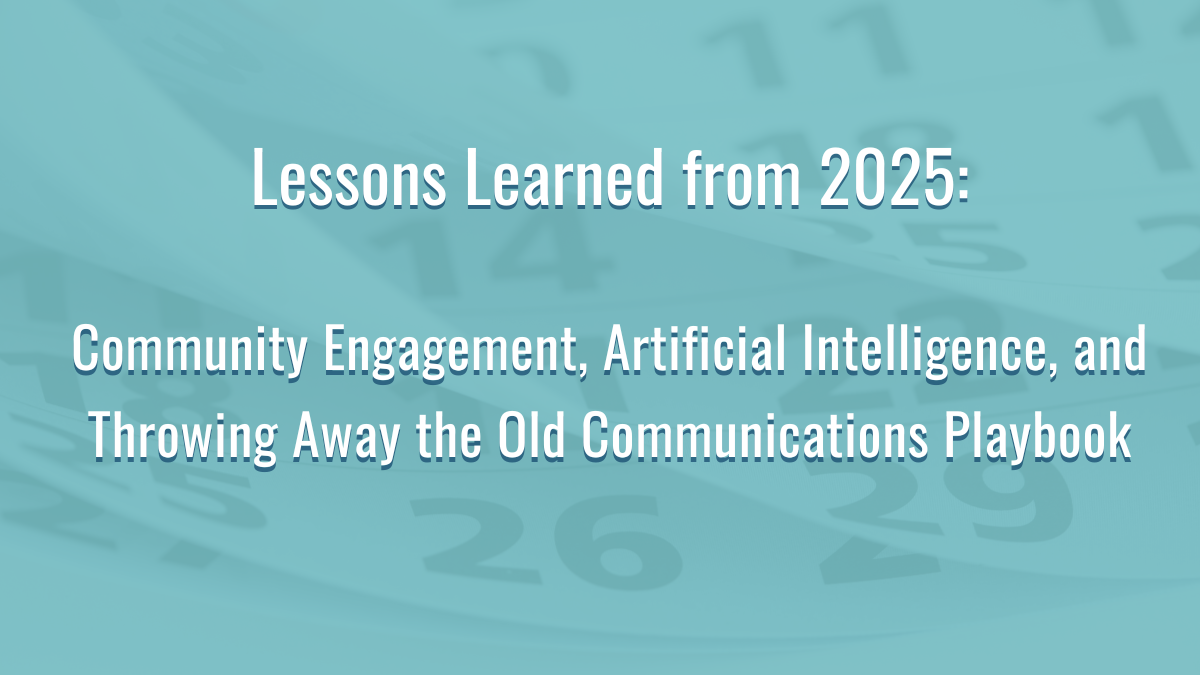
Key Takeaways:
Genuine community engagement means transparent, two-way relationships with the people who matter most to your organization.
Human connections, authentic storytelling, and real relationships will always be more relevant than AI-generated content.
Continued splintering of the media ecosystem means organizations must adapt new approaches and messaging strategies to succeed.
We like to think of trying times as opportunities for growth and education. I think we can all agree 2025 was ripe for both.
Staying informed on current events and maintaining one’s sanity often felt like an Olympic sport last year. Despite that, here at Impact Campaigns, we enjoyed some big personal and professional successes, from kids starting new schools (and college!) to helping some amazing causes and organizations move forward with their missions.
So, we’ve been reflecting on the lessons we learned last year.
Some surprised us.
Others confirmed what we’ve suspected all along.
All of them reinforced why the work we do matters now more than ever.
Lesson #1: Community Engagement Isn’t Optional—It’s Your Survival Strategy
Here’s the thing nobody wants to admit: most organizations are terrible at community engagement.
They think sending out a press release counts as public relations.
They do one email and one social post for a town hall meeting at 2 p.m. on a Tuesday and wonder why only three people showed up.
They collect feedback and then do absolutely nothing with it.
That’s not engagement. That’s checking a box.
Real community engagement is about building authentic relationships with the people who matter most to your organization. It’s about having honest, two-way conversations where people feel heard, valued, and empowered to contribute.
It’s talking with people, not at them.
This year, we worked on the Hollice T. Williams Park Design + Expansion project here in Pensacola. This wasn’t just another development deal—it was about reimagining a cherished community space that holds deep meaning for generations of Pensacolians. The stakes—and, occasionally, emotions—were high, and getting it right meant first listening to understand what the community wanted.
So we went directly to the people. We hosted community meetings in the neighborhoods, set up visual preference surveys with interactive maps and models in community centers, and created opportunities for input both online and in person.
We met people where they were—literally and figuratively. And you know what? They showed up.
The result? A project that genuinely reflects community priorities and, most importantly, has earned public trust–a rarity in times like these.
As Pensacola Mayor D.C. Reeves said,
“The community engagement process for the Hollice T. Williams Park Design and Expansion set a new standard for how we approach development in our city. When people see their input reflected in the final outcome, trust is built—and that trust is invaluable.”
That’s the power of doing engagement right—and it’s not just for government projects. If your organization isn’t prioritizing genuine community engagement with your prospects, donors, members, or citizens, you’re already behind.
Lesson #2: AI Can’t Replace Human Connection (And It Never Will)
Yes, we know that AI is revolutionizing work and disrupting many industries.
We’ve heard the doom-and-gloom predictions that it will take over marketing and PR, too. We just disagree.
Don’t get us wrong, AI is an incredible tool. We use it ourselves for certain applications.
But here’s what AI can’t do: capture the essence of the human spirit.
AI can’t build real relationships.
AI can’t read the room at a community meeting and adjust on the fly.
AI can’t learn authentic storytelling and combine that with a communications strategy.
And AI, no matter how sophisticated, can never replicate the warmth of a handshake, the understanding in someone’s eyes when they really get what you’re trying to accomplish, or the trust that builds when you show up consistently over time.
As the internet becomes increasingly filled with AI-generated content, platforms are drowning in fake videos and posts that are increasingly difficult to distinguish from reality. If everyone is using AI to generate their communications, everything will begin to look and sound the same (and arguably, it’s already begun).
And in that landscape, human ingenuity—real creativity, authentic voices, genuine connections and relationships—will be the only thing that stands out. In a world of automated content, being genuinely yourself (human) is your competitive advantage.
Lesson #3: Your Old Communications Playbook Is Dead—Burn It
Once upon a time, you could win a campaign, get more customers, or drive more donations simply by running slick TV ads, sending out glossy mailers, and saying the right buzzwords at the right time.
Those days are long gone.
If you haven’t noticed, our media ecosystem continues to fragment. More and more consumers, voters, customers, and clients get their news and information from a growing number of sources, from traditional news outlets to cable news, online news magazines, digital influencers, content creators, and, in some cases, AI-generated sources (with little to no respect for the truth).
Much has been written about Donald Trump’s 2024 campaign, which leaned heavily into podcasts—appearing on shows like Joe Rogan’s for unscripted, hours-long conversations that reached millions of people in a way traditional media never could.
That wasn’t in anyone’s old playbook, but it worked.
Look at Zorhan Mamdani’s victory in New York City, or Abigail Spanberger’s success in Virginia. These weren’t flukes. They were the result of authentic conversations, meaningful storytelling, meeting voters where they are, listening to what actually matters to them, and communicating in ways that felt real.
And it’s not just politicians finding success this way. The entire landscape of communication has fundamentally shifted.
People are no longer appeased by vague, listless rhetoric. They’ve developed finely tuned BS detectors. Nobody wants another AI-generated email that sounds like all the other AI-generated emails. They don’t want corporate-speak, or political double-talk, or careful, focus-grouped messaging that says nothing.
They want someone who actually understands their struggles.
They want to feel like their voice matters.
Whether you’re a nonprofit seeking funding, a local government trying to engage constituents, or a corporation trying to attract quality talent, the formula is the same: First, listen and get to know your audience. Really know them.
Second, figure out how your offer solves a real problem or speaks to a core belief they have about themselves.
And third, meet people where they are to share your why and connect authentically.
That’s not the old playbook. It is the only playbook that works anymore.
The Bottom Line
So what did 2025 teach us?
One: Community engagement isn’t a “nice-to-have” tool in your communications toolbox. It’s your survival strategy. Engage your customers, donors, clients, or citizens authentically, or risk having your competitors pass you by.
Two: In a world drowning in AI-generated content, being genuinely human (flaws and all) is your superpower. Lean into it.
Three: The old communications playbook is dead. The organizations that thrive are the ones that listen first, speak second, and show up consistently with authenticity.
These aren’t just abstract concepts. They’re the principles that guided our work this year and delivered real results for our clients.
They’re what separates organizations that struggle to gain traction from those that build lasting trust and achieve their goals.
As 2026 begins to unfold, we’re more convinced than ever that authentic human connection is the most valuable—and increasingly rare—asset any organization can offer.
Ready to Make 2026 Your Best Year Yet?
The landscape has changed. The rules are different. But the opportunity for organizations willing to authentically connect with their customers, community, or clients has never been greater.
If you’re ready to throw out your old playbook and build real connections with your community, we’d love to talk.


